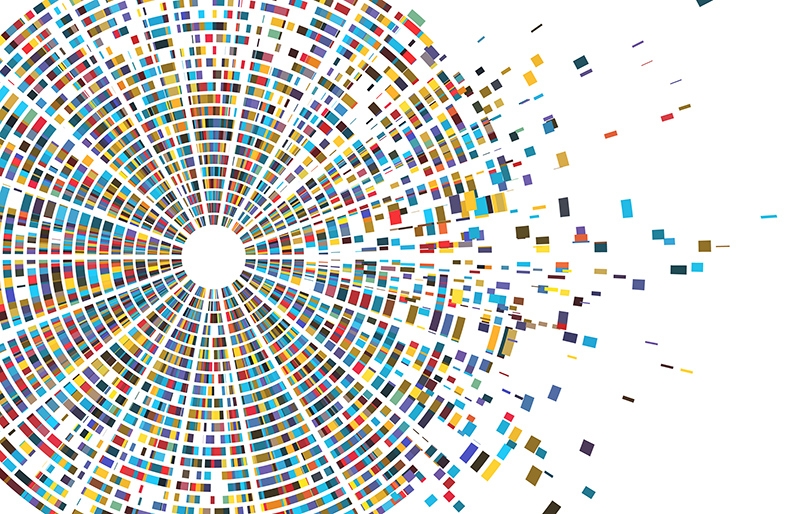One of the key priorities of interventions for autism spectrum disorder (ASD) is starting early, with some evidence showing infants as young as seven months old could benefit. Yet, most children in North America aren’t diagnosed with ASD until they’re over four years of age. New research led by The Hospital for Sick Children (SickKids) and the University of Alberta published on December 5, 2019 in Nature Communications has found testing the DNA of siblings of individuals with ASD may be predictive of a future diagnosis even if symptoms aren’t yet apparent.
ASD refers to a group of neurodevelopmental conditions resulting in challenges related to communication, social understanding and behaviour. Studies show families who have a child with ASD have a 6.9 to 19.5 per cent chance of another child having ASD and a 30 to 40 per cent chance of another child having atypical development.

Genomic Factors Linked to ASD-Related Traits
According to Dr. Stephen Scherer, Senior Scientist and Director of the Centre for Applied Genomics (TCAG) at SickKids, Director of the McLaughlin Centre at the University of Toronto and principal investigator of the study: “Genetic factors are the most likely reason we see a clustering of ASD related traits in families. We wanted to investigate the possible benefits of genetic testing for infants whose older sibling had already been diagnosed with ASD. If we can identify those children early, we may be able to enroll them earlier in therapies.”
The researchers looked for the presence of genetic alterations that have been linked to ASD called copy number variations (CNVs) in over 288 infant siblings from 253 families. By age 3, 157 siblings were either diagnosed with ASD or developing atypically. DNA testing revealed CNVs in genes relevant to ASD in 11 (7 per cent) of the 157 siblings who were eventually diagnosed.
The study found that the presence of an ASD-relevant CNV in a sibling had a high likelihood of predicting a future diagnosis of ASD or atypical development. This marks the first time that scientists have been able to quantify the predictive value of CNVs in determining these diagnoses.
Early Identification Could Lead to Earlier Intervention
“These findings add to a growing body of evidence that biomarkers might be helpful in identifying pre-symptomatic infants who are likely to develop ASD or other developmental challenges,” says Dr. Lonnie Zwaigenbaum, Professor of Pediatrics, Stollery Children’s Hospital Foundation Chair in Autism and Stollery Science Lab Distinguished Researcher at the University of Alberta.
“At this point, we can’t fully determine the anticipated severity of a child’s future symptoms. What we can say is that it’s important to closely monitor their development and start therapeutic interventions early to support their skill development and address emerging functional impairments related to ASD.”
The research team has confirmed similar findings in a separate group of 2,110 families having one child with, and a second child without ASD. Their next step will be to look beyond CNVs and determine how newer technologies – like whole genome sequencing – might increase the early genetic detection rate.
YOU CAN DOWNLOAD THE ENTIRE STUDY HERE: https://www.nature.com/articles/s41467-019-13380-2
The families who participated in the primary study are from the Baby Sibling Research Consortium (BSRC). Additional families that participated in replication testing are from the Simons Simplex Collection. This work was supported by Autism Speaks, Autism Speaks Canada, the Simons Foundation Autism Research Initiative, National Institutes of Health (NIH), National Institute of Mental Health (NIMH), Canadian Institutes of Health Research (CIHR), Canada Foundation for Innovation (CFI), Genome Canada, Ontario Genomics, Kids Brain Health Network, Canadian Institutes for Advanced Research (CIFAR), Stollery Children’s Hospital Foundation through the Women and Children’s Health Research Institute at the University of Alberta, Ontario Brain Institute, the Government of Ontario, the McLaughlin Centre at the University of Toronto, and SickKids Foundation.
About The Hospital for Sick Children (SickKids)
The Hospital for Sick Children (SickKids) is recognized as one of the world’s foremost paediatric health-care institutions and is Canada’s leading centre dedicated to advancing children’s health through the integration of patient care, research and education. Founded in 1875 and affiliated with the University of Toronto, SickKids is one of Canada’s most research-intensive hospitals and has generated discoveries that have helped children globally. Its mission is to provide the best in complex and specialized family-centred care; pioneer scientific and clinical advancements; share expertise; foster an academic environment that nurtures health-care professionals; and champion an accessible, comprehensive and sustainable child health system. SickKids is a founding member of Kids Health Alliance, a network of partners working to create a high quality, consistent and coordinated approach to paediatric health care that is centred around children, youth and their families. SickKids is proud of its vision for Healthier Children. A Better World.
About the University of Alberta Faculty of Medicine & Dentistry
The Faculty of Medicine & Dentistry at the University of Alberta is a leader in educating and training exceptional practitioners and researchers of the highest international standards. The faculty’s mission is to advance health through excellence in teaching, research and patient care. It is home to one of the top 100 ranked medical schools in the world. For more information, please visit www.ualberta.ca/medicine.
Media Contacts
Jessamine Luck
Communications Advisor
The Hospital for Sick Children (SickKids)
jessamine.luck@sickkids.ca
416-813-7654 ext. 201436
Ross Neitz
Communications Associate
University of Alberta
rneitz@ualberta.ca7
80-492-5986
This article is reprinted with permission. You may view the original article, published on December 5th, 2019, at https://autismsciencefoundation.org/news/genome-testing-for-siblings-of-individuals-may-aid-in-a-diagnosis-before-symptoms-appear/.



